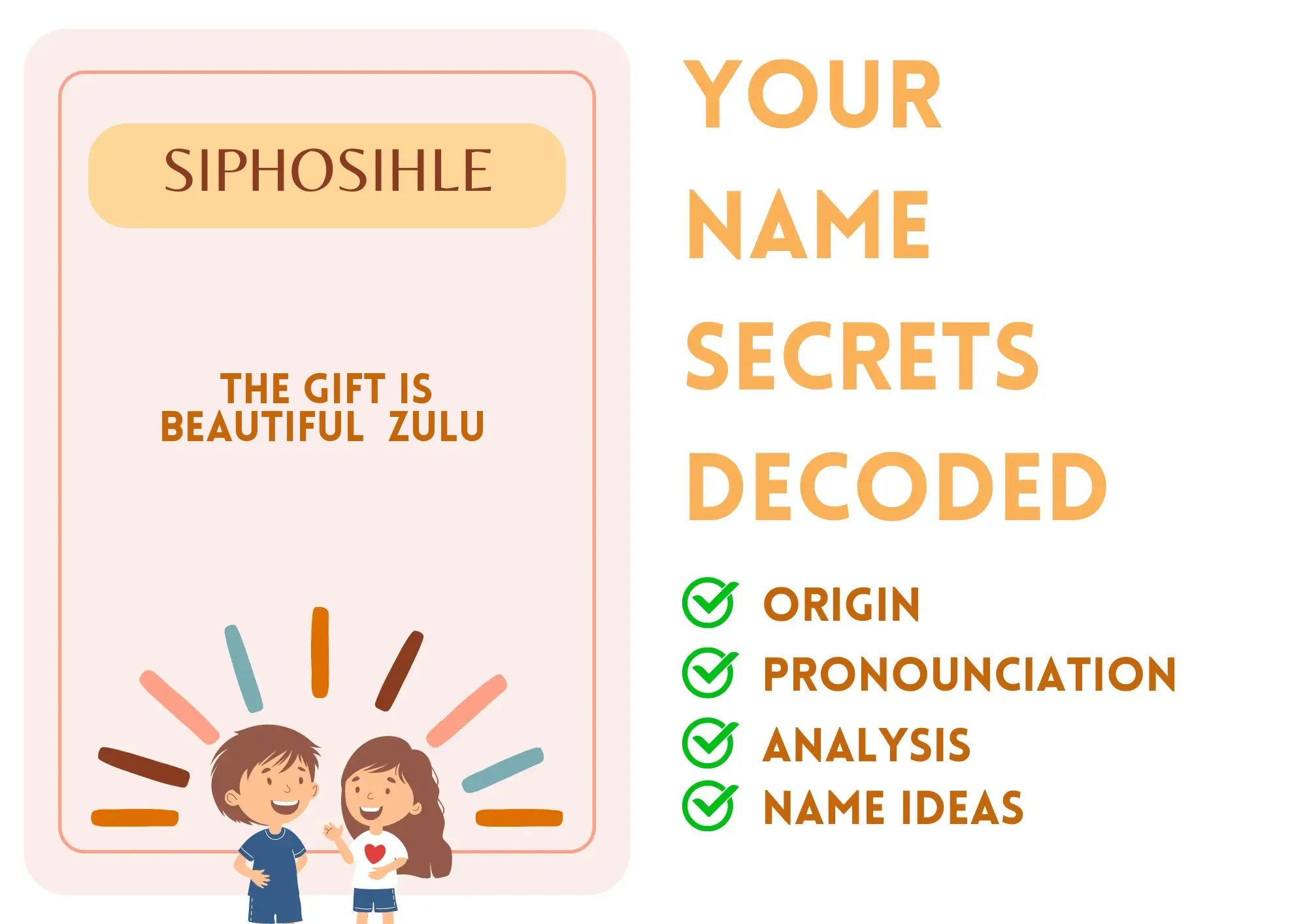
Siphosihle
Siphosihle is a meaningful and beautifully unique name of Zulu origin, translating to 'the gift is beautiful' or 'beautiful gift.' This name is predominantly used within South African culture, particularly among Zulu speakers. It is considered a unisex name, though it may lean more towards female usage in contemporary settings. It reflects deep cultural significance: beauty and the recognition of life's gifts.
Siphosihle is positively perceived, embodying themes of beauty, gratitude, and blessings. It is relatively easy to write and pronounce, making it a welcoming choice for many families.
This name is celebrated for its cultural resonance and is appreciated for its poetic sound and meaning, granting it a special place among African names.
Basic Information
Gender: Unisex
Sounds Like: SEE-poh-shee-leh
Pronunciation Explanation: The first syllable 'SEE' has a long 'e' sound, followed by 'poh,' the 'shi' as in 'she,' and ending with 'leh,' which is short and crisp.
Summary and Meaning
Meaning: the gift is beautiful (Zulu)
Origin: The name Siphosihle is rooted in Zulu culture and language, a significant ethnic group in South Africa.
Usage: Siphosihle is traditionally a unisex name, though it is more commonly given to girls.
Name Number (Chaldean)
Name Number (Pythagorean)
Popularity (Global Rank)
Overall: 74463
Boys: 45944
Girls:
Most Popular in
Religious and Cultural Significance
Religion: African Traditional
Background: In the Zulu culture, names are often reflective of life experiences, gratitude, and the spiritual significance associated with one’s birth or personal journey.
Cultural Significance: Siphosihle serves not only as a name but as a reminder of the beauty and value of life’s gifts, making it a cherished choice among families.
Historical Significance: Siphosihle, along with many Zulu names, hints at the historical appreciation of nature's beauty and the everyday blessings received in life, deeply interwoven within Zulu traditions and narratives.
Popular Culture
Literature and Mythology: Though not a widely recognized name in classic literature, Siphosihle may appear in contemporary Zulu novels and stories celebrating African heritage.
Movies and Television: The name may feature in local films or shows that reflect the vibrant Zulu culture and celebrates everyday life in South Africa.
Feelings and Perceptions
Perception: Siphosihle is generally perceived positively amongst the community. It evokes connotations of beauty, grace, and appreciation for life’s gifts.
Positive Feelings: Unique, beautiful, expressive, culturally rich, profound.
Negative Feelings: May be seen as complex to some non-Zulu speakers, potentially mispronounced.
Practical Considerations
Ease of Writing and Calling: The name Siphosihle is moderately easy to write and pronounce for speakers familiar with Zulu phonetics. Stylized with distinct syllables, it can take a moment for others to grasp.
Common Typos and Misspellings: Siphosile,Siphosehle,Siphokuhle,Siphosihleh
Common Nicknames: Sipho,Si,Shele
Siphosihle Popularity
Siphosihle Usage and Popularity By Country
| Country | Rank (Overall) |
|---|---|
| South Africa | 3762 |
| United Kingdom | 118019 |
| United States | 539518 |
Siphosihle Usage and Popularity By City
| City | Rank (Overall) |
|---|---|
| Johannesburg | 4701 |
| Cape Town | 2623 |
| Port Elizabeth | 1026 |
| Bisho | 814 |
| Durban | 6145 |
| East London | 18 |
| Bloemfontein | 2783 |
| Witbank | 2644 |
| Paarl | 1274 |
| Queenstown | 1002 |
Compatibility Analysis
Famous Persons Named Siphosihle
No results found for Siphosihle.
Related Names
Similar Sounding Names:
Siphokazi,Sinembe,Sithandiwe,Siyabonga

